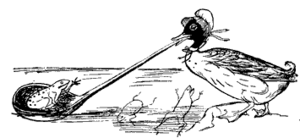Runcible (nonfiction): Difference between revisions
Jump to navigation
Jump to search
No edit summary |
No edit summary |
||
| Line 8: | Line 8: | ||
Other poems include mention of a "runcible cat", a "runcible goose" (in the sense of "silly person"), and a "runcible wall". | Other poems include mention of a "runcible cat", a "runcible goose" (in the sense of "silly person"), and a "runcible wall". | ||
== In the News == | |||
<gallery mode="traditional"> | |||
File:Edward Lear.jpg|link=Edward Lear (nonfiction)|[[Edward Lear (nonfiction)|Edward Lear]] pleased with all things Runcible. | |||
</gallery> | |||
== Fiction cross-reference == | == Fiction cross-reference == | ||
| Line 14: | Line 20: | ||
== Nonfiction cross-reference == | == Nonfiction cross-reference == | ||
* [[Edward Lear (nonfiction)]] | * [[Edward Lear (nonfiction)]] | ||
External links: | |||
* [https://en.wikipedia.org/wiki/Runcible Runcible] | * [https://en.wikipedia.org/wiki/Runcible Runcible] | ||
Latest revision as of 18:55, 24 June 2016
Runcible is a nonsense word invented by Edward Lear (nonfiction).
The word appears (as an adjective) several times in his works, most famously as the "runcible spoon" used by the Owl and the Pussycat.
The word "runcible" was apparently one of Lear's favourite inventions, appearing in several of his works in reference to a number of different objects.
In his verse self-portrait, The Self-Portrait of the Laureate of Nonsense, it is noted that "he weareth a runcible hat".
Other poems include mention of a "runcible cat", a "runcible goose" (in the sense of "silly person"), and a "runcible wall".
In the News
Edward Lear pleased with all things Runcible.
Fiction cross-reference
Nonfiction cross-reference
External links:

